A Brave & Generous New World
The Future of Indigenous Environmental Stewardship is Shared.
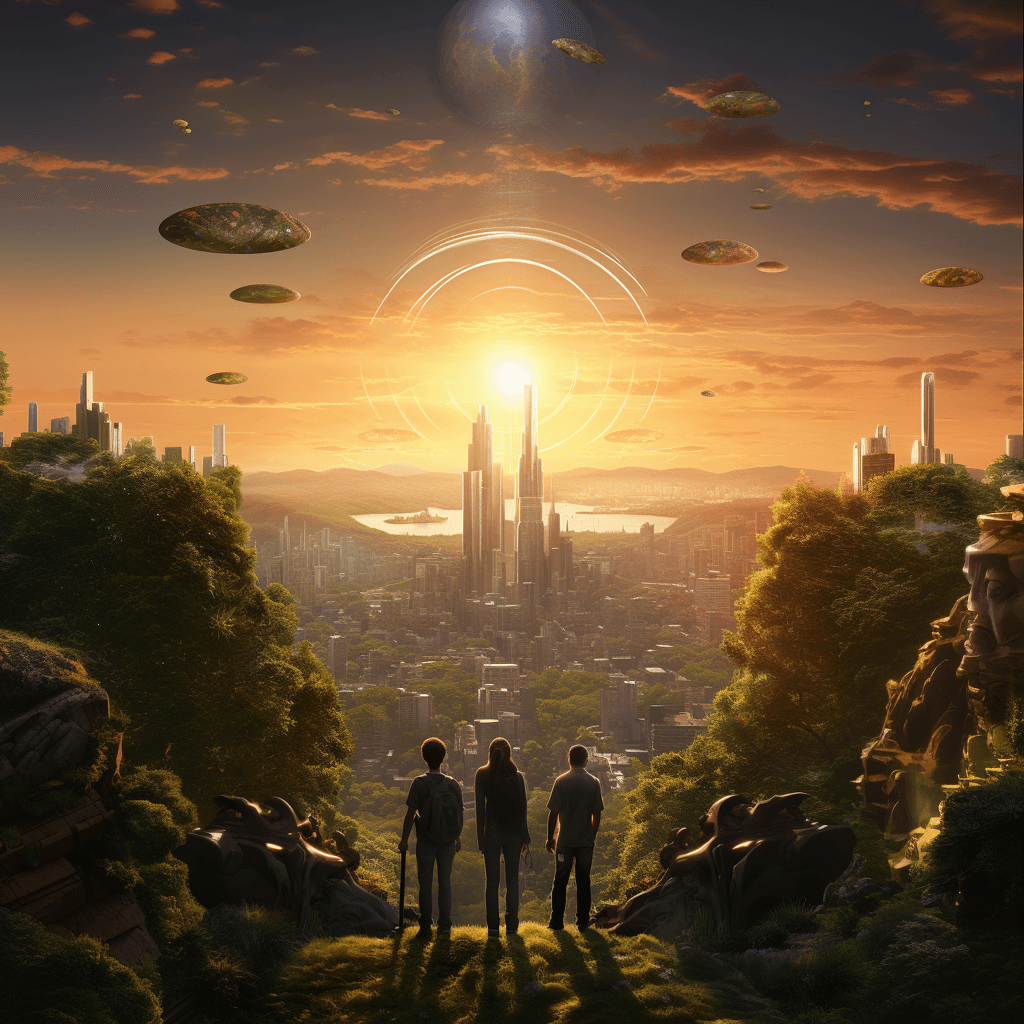
Futures Narrative
October 2023
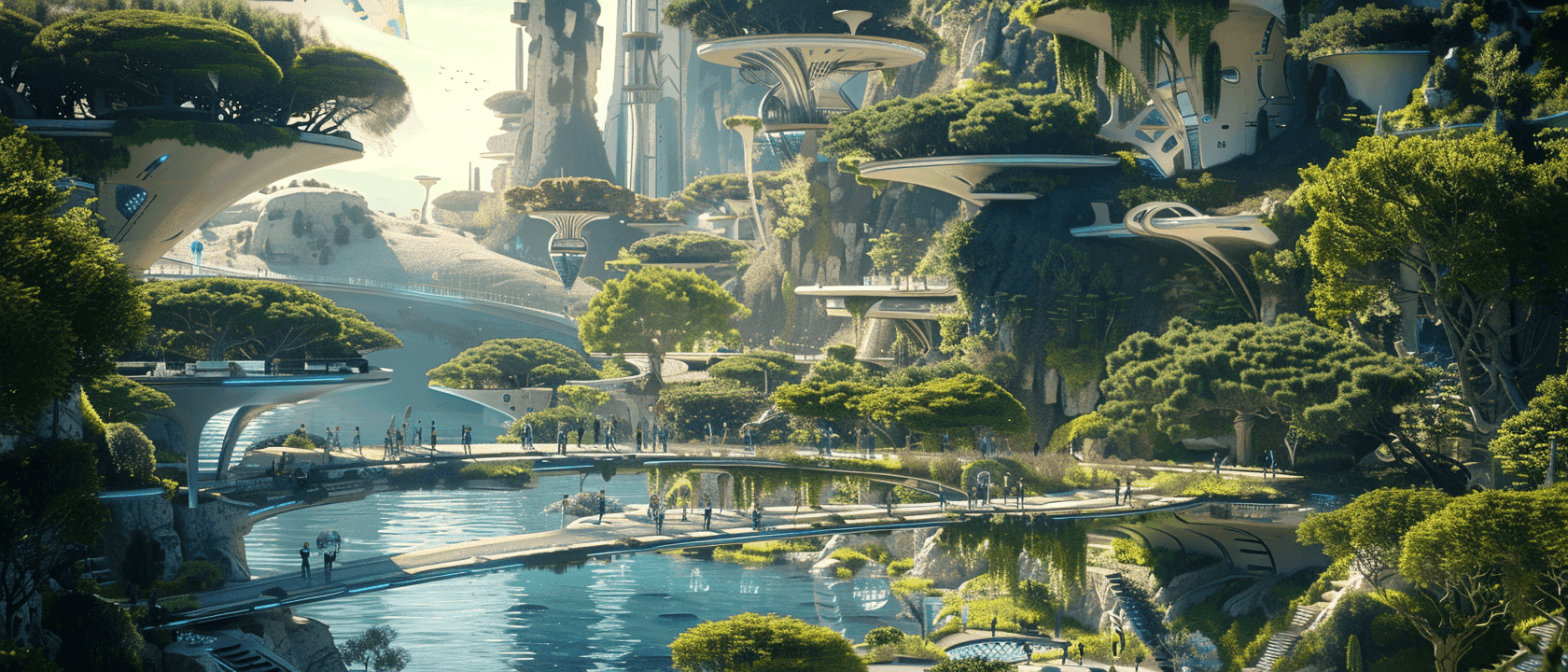

It feels more important than ever, that we begin the work of working to practice imagining possible alternative futures for first nations people.
/ Australian Context
On 14 October 2023, Australians voted NO in a referendum on whether to change the 1898 constitution to recognise the First Peoples of Australia through the establishment of a Voice to Parliament, which would advise the government about laws as they relate to indigenous peoples.
The Voice was the first recommendation from the Uluru Statement, which also includes a treaty-making and truth-telling process, aimed at reconciling Australia's past and the ongoing exclusion of indigenous peoples from Australia's imagined futures, and the systems which enable those imagined futures to develop.
Whilst initial support suggested the Voice to Parliament would proceed, it was ultimately defeated and the public's appetite for further truth and treaty work has since dropped significantly. Richard Flanagan's message 'that we continue to enshrine ourselves in the European / American imagination', identifies the urgency with which Australians must work to reimagine Australian futures, from within the context of our own painful history and the first people who continue to be excluded from our national imagination and stories.
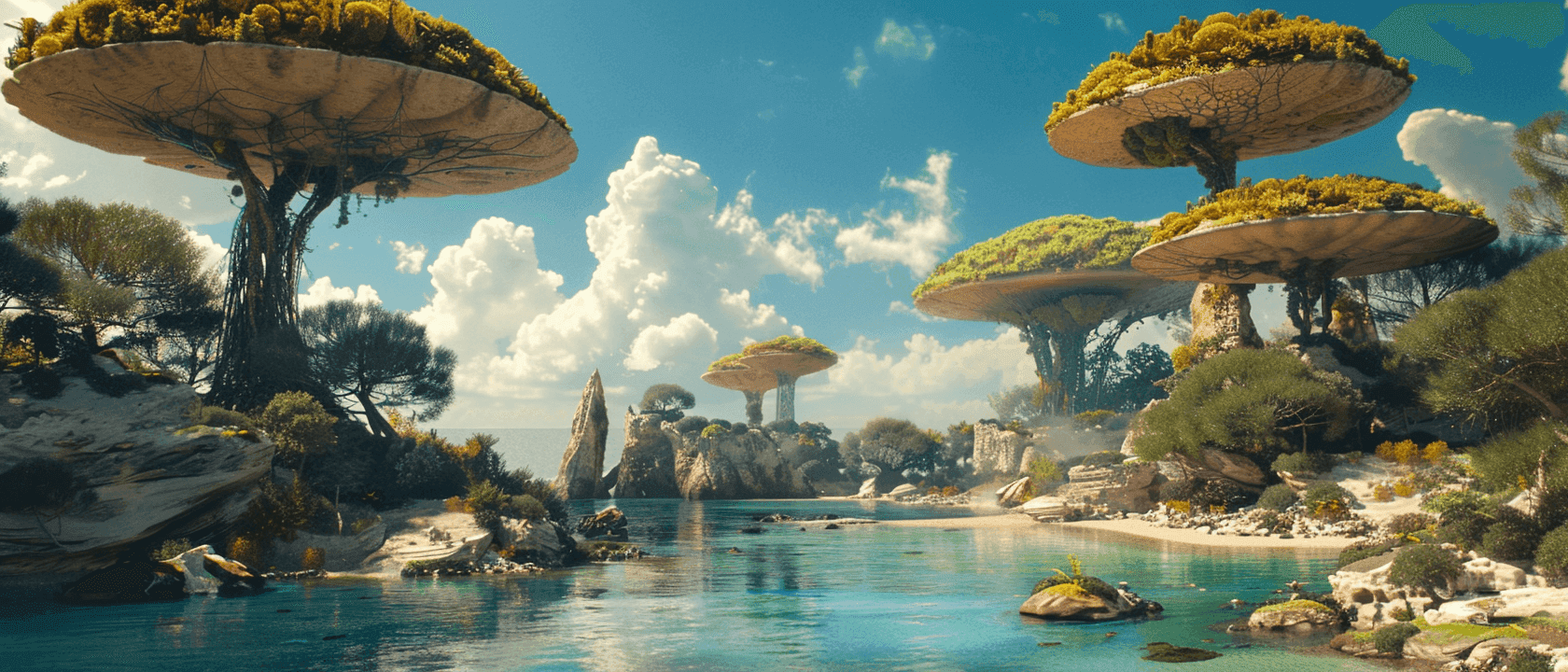
Future Wheels
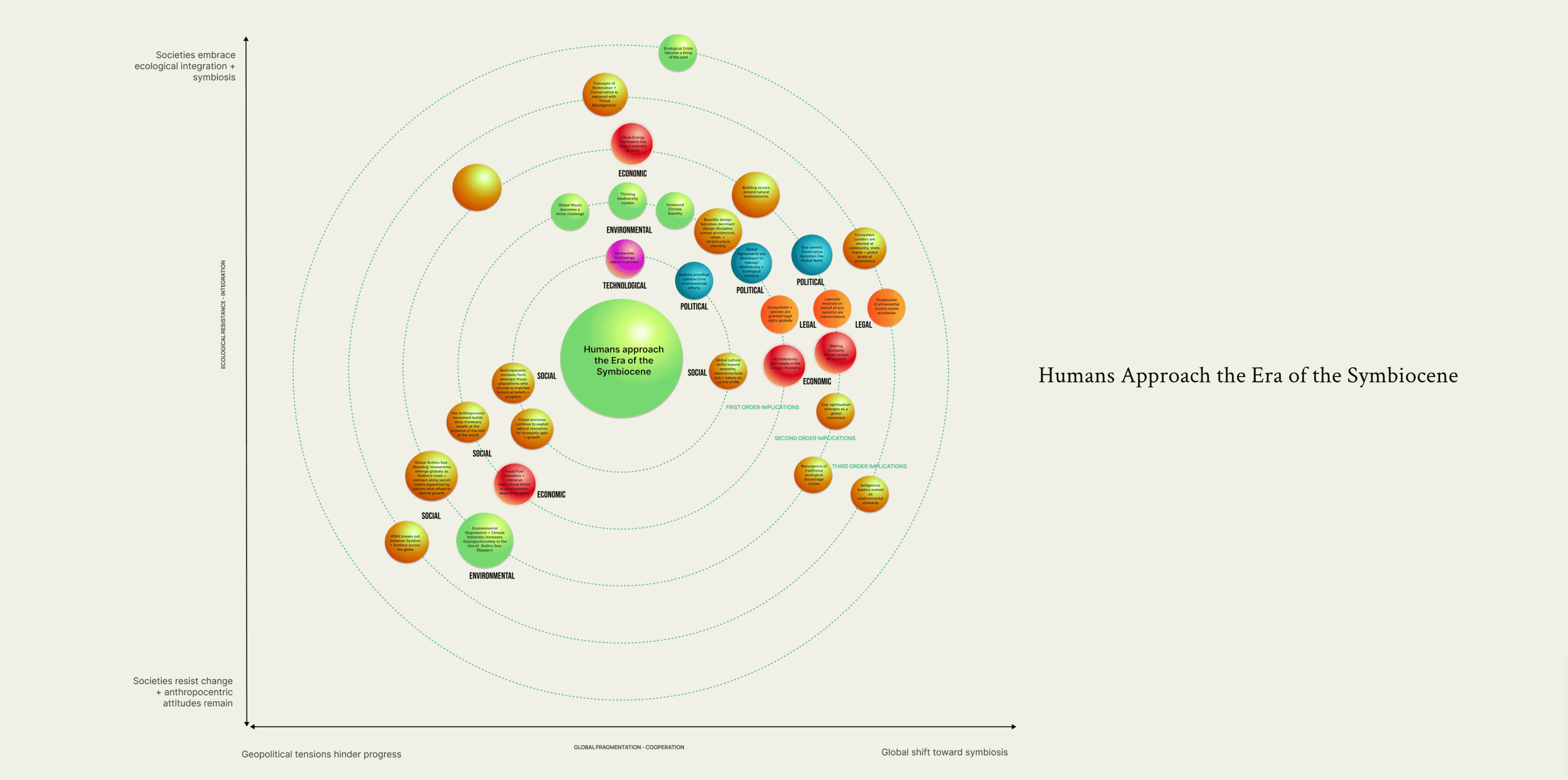


Cross Impact Analysis

Scenario # | A Brave (+ Generous) New World
The Future of Indigenous Environmental Stewardship is Shared.
Originally smart cities were all bits and bytes. Data-driven systems that surveilled everything from citizens to rainfall. Connected iOTs and smart everything brought visibility and accountability, . . . but like many things of the past, those cities were smart, but not wise. Massive ‘smart infrastructure’ costs meant populations were largely concentrated in dense urban areas, which led to significant increases in natural land regeneration and rewilding in rural areas. In this data driven landscape, smart city sustainability metrics become the cost of entry to global collaboration; so national leaders everywhere sought the help of indigenous elders who were tasked with reimagining the markers of a thriving ecologically balanced city.
With so many citizens living so close together all over the world, it’s no surprise that the peer-to-peer sharing economy moved beyond the digital environment . . thanks in large part to the rapid adoption of peeragogy throughout the global decentralised peer-schooling systems. These structural shifts embedded a deep culture of generosity within socio-ecological systems across the globe. ShareTokens, once the currency of digital natives . . have become the human signal of us, the Symbios people, at the heart of which are indigenous elders from every land. As the sharing culture entered the personal and political realms, indigenous knowledge webs emerged online . . leading to a cultural renaissance of sorts, and more importantly, a global conversation that emerged deep from our humanity, around the idea of a multipolar network of shared access, power and resources . . which culminated in ‘The Manifesto for Shared Global Futures’ that you see today.
But global ‘Smart City’ infrastructure also became a mechanism for division as geopolitical tensions fuelled a huge resistance movement amongst those who chose to maintain their historical beliefs, and ideas about progress. Anthropocenic enclaves surfaced across the globe, continuing to exploit natural resources for economic gain. New Symbio governments brought lawsuits forth to the Anthro People on behalf of regional ecosystems which marginalised Anthro People and sent their trade underground. ‘Anthro Sea-Steading’ movements emerged globally as Anthro People began to trade + connect along secret routes supported by nations who refused to delimit growth. There is a constant tension between Symbios and Anthros now and reconciliation feels hard to reach. We know that there can be true symbiosis unless all humans can manifest value and harmony, in a symbiotic way that makes sense for them.
It feels more important than ever, that we begin the work of working to practice imagining possible alternative futures for first nations people.
/ Australian Context
On 14 October 2023, Australians voted NO in a referendum on whether to change the 1898 constitution to recognise the First Peoples of Australia through the establishment of a Voice to Parliament, which would advise the government about laws as they relate to indigenous peoples.
The Voice was the first recommendation from the Uluru Statement, which also includes a treaty-making and truth-telling process, aimed at reconciling Australia's past and the ongoing exclusion of indigenous peoples from Australia's imagined futures, and the systems which enable those imagined futures to develop.
Whilst initial support suggested the Voice to Parliament would proceed, it was ultimately defeated and the public's appetite for further truth and treaty work has since dropped significantly. Richard Flanagan's message 'that we continue to enshrine ourselves in the European / American imagination', identifies the urgency with which Australians must work to reimagine Australian futures, from within the context of our own painful history and the first people who continue to be excluded from our national imagination and stories.

Future Wheels



Cross Impact Analysis

Scenario # | A Brave (+ Generous) New World
The Future of Indigenous Environmental Stewardship is Shared.
Originally smart cities were all bits and bytes. Data-driven systems that surveilled everything from citizens to rainfall. Connected iOTs and smart everything brought visibility and accountability, . . . but like many things of the past, those cities were smart, but not wise. Massive ‘smart infrastructure’ costs meant populations were largely concentrated in dense urban areas, which led to significant increases in natural land regeneration and rewilding in rural areas. In this data driven landscape, smart city sustainability metrics become the cost of entry to global collaboration; so national leaders everywhere sought the help of indigenous elders who were tasked with reimagining the markers of a thriving ecologically balanced city.
With so many citizens living so close together all over the world, it’s no surprise that the peer-to-peer sharing economy moved beyond the digital environment . . thanks in large part to the rapid adoption of peeragogy throughout the global decentralised peer-schooling systems. These structural shifts embedded a deep culture of generosity within socio-ecological systems across the globe. ShareTokens, once the currency of digital natives . . have become the human signal of us, the Symbios people, at the heart of which are indigenous elders from every land. As the sharing culture entered the personal and political realms, indigenous knowledge webs emerged online . . leading to a cultural renaissance of sorts, and more importantly, a global conversation that emerged deep from our humanity, around the idea of a multipolar network of shared access, power and resources . . which culminated in ‘The Manifesto for Shared Global Futures’ that you see today.
But global ‘Smart City’ infrastructure also became a mechanism for division as geopolitical tensions fuelled a huge resistance movement amongst those who chose to maintain their historical beliefs, and ideas about progress. Anthropocenic enclaves surfaced across the globe, continuing to exploit natural resources for economic gain. New Symbio governments brought lawsuits forth to the Anthro People on behalf of regional ecosystems which marginalised Anthro People and sent their trade underground. ‘Anthro Sea-Steading’ movements emerged globally as Anthro People began to trade + connect along secret routes supported by nations who refused to delimit growth. There is a constant tension between Symbios and Anthros now and reconciliation feels hard to reach. We know that there can be true symbiosis unless all humans can manifest value and harmony, in a symbiotic way that makes sense for them.
It feels more important than ever, that we begin the work of working to practice imagining possible alternative futures for first nations people.
/ Australian Context
On 14 October 2023, Australians voted NO in a referendum on whether to change the 1898 constitution to recognise the First Peoples of Australia through the establishment of a Voice to Parliament, which would advise the government about laws as they relate to indigenous peoples.
The Voice was the first recommendation from the Uluru Statement, which also includes a treaty-making and truth-telling process, aimed at reconciling Australia's past and the ongoing exclusion of indigenous peoples from Australia's imagined futures, and the systems which enable those imagined futures to develop.
Whilst initial support suggested the Voice to Parliament would proceed, it was ultimately defeated and the public's appetite for further truth and treaty work has since dropped significantly. Richard Flanagan's message 'that we continue to enshrine ourselves in the European / American imagination', identifies the urgency with which Australians must work to reimagine Australian futures, from within the context of our own painful history and the first people who continue to be excluded from our national imagination and stories.

Future Wheels



Cross Impact Analysis

Scenario # | A Brave (+ Generous) New World
The Future of Indigenous Environmental Stewardship is Shared.
Originally smart cities were all bits and bytes. Data-driven systems that surveilled everything from citizens to rainfall. Connected iOTs and smart everything brought visibility and accountability, . . . but like many things of the past, those cities were smart, but not wise. Massive ‘smart infrastructure’ costs meant populations were largely concentrated in dense urban areas, which led to significant increases in natural land regeneration and rewilding in rural areas. In this data driven landscape, smart city sustainability metrics become the cost of entry to global collaboration; so national leaders everywhere sought the help of indigenous elders who were tasked with reimagining the markers of a thriving ecologically balanced city.
With so many citizens living so close together all over the world, it’s no surprise that the peer-to-peer sharing economy moved beyond the digital environment . . thanks in large part to the rapid adoption of peeragogy throughout the global decentralised peer-schooling systems. These structural shifts embedded a deep culture of generosity within socio-ecological systems across the globe. ShareTokens, once the currency of digital natives . . have become the human signal of us, the Symbios people, at the heart of which are indigenous elders from every land. As the sharing culture entered the personal and political realms, indigenous knowledge webs emerged online . . leading to a cultural renaissance of sorts, and more importantly, a global conversation that emerged deep from our humanity, around the idea of a multipolar network of shared access, power and resources . . which culminated in ‘The Manifesto for Shared Global Futures’ that you see today.
But global ‘Smart City’ infrastructure also became a mechanism for division as geopolitical tensions fuelled a huge resistance movement amongst those who chose to maintain their historical beliefs, and ideas about progress. Anthropocenic enclaves surfaced across the globe, continuing to exploit natural resources for economic gain. New Symbio governments brought lawsuits forth to the Anthro People on behalf of regional ecosystems which marginalised Anthro People and sent their trade underground. ‘Anthro Sea-Steading’ movements emerged globally as Anthro People began to trade + connect along secret routes supported by nations who refused to delimit growth. There is a constant tension between Symbios and Anthros now and reconciliation feels hard to reach. We know that there can be true symbiosis unless all humans can manifest value and harmony, in a symbiotic way that makes sense for them.
It feels more important than ever, that we begin the work of working to practice imagining possible alternative futures for first nations people.
/ Australian Context
On 14 October 2023, Australians voted NO in a referendum on whether to change the 1898 constitution to recognise the First Peoples of Australia through the establishment of a Voice to Parliament, which would advise the government about laws as they relate to indigenous peoples.
The Voice was the first recommendation from the Uluru Statement, which also includes a treaty-making and truth-telling process, aimed at reconciling Australia's past and the ongoing exclusion of indigenous peoples from Australia's imagined futures, and the systems which enable those imagined futures to develop.
Whilst initial support suggested the Voice to Parliament would proceed, it was ultimately defeated and the public's appetite for further truth and treaty work has since dropped significantly. Richard Flanagan's message 'that we continue to enshrine ourselves in the European / American imagination', identifies the urgency with which Australians must work to reimagine Australian futures, from within the context of our own painful history and the first people who continue to be excluded from our national imagination and stories.

Future Wheels



Cross Impact Analysis

Scenario # | A Brave (+ Generous) New World
The Future of Indigenous Environmental Stewardship is Shared.
Originally smart cities were all bits and bytes. Data-driven systems that surveilled everything from citizens to rainfall. Connected iOTs and smart everything brought visibility and accountability, . . . but like many things of the past, those cities were smart, but not wise. Massive ‘smart infrastructure’ costs meant populations were largely concentrated in dense urban areas, which led to significant increases in natural land regeneration and rewilding in rural areas. In this data driven landscape, smart city sustainability metrics become the cost of entry to global collaboration; so national leaders everywhere sought the help of indigenous elders who were tasked with reimagining the markers of a thriving ecologically balanced city.
With so many citizens living so close together all over the world, it’s no surprise that the peer-to-peer sharing economy moved beyond the digital environment . . thanks in large part to the rapid adoption of peeragogy throughout the global decentralised peer-schooling systems. These structural shifts embedded a deep culture of generosity within socio-ecological systems across the globe. ShareTokens, once the currency of digital natives . . have become the human signal of us, the Symbios people, at the heart of which are indigenous elders from every land. As the sharing culture entered the personal and political realms, indigenous knowledge webs emerged online . . leading to a cultural renaissance of sorts, and more importantly, a global conversation that emerged deep from our humanity, around the idea of a multipolar network of shared access, power and resources . . which culminated in ‘The Manifesto for Shared Global Futures’ that you see today.
But global ‘Smart City’ infrastructure also became a mechanism for division as geopolitical tensions fuelled a huge resistance movement amongst those who chose to maintain their historical beliefs, and ideas about progress. Anthropocenic enclaves surfaced across the globe, continuing to exploit natural resources for economic gain. New Symbio governments brought lawsuits forth to the Anthro People on behalf of regional ecosystems which marginalised Anthro People and sent their trade underground. ‘Anthro Sea-Steading’ movements emerged globally as Anthro People began to trade + connect along secret routes supported by nations who refused to delimit growth. There is a constant tension between Symbios and Anthros now and reconciliation feels hard to reach. We know that there can be true symbiosis unless all humans can manifest value and harmony, in a symbiotic way that makes sense for them.
It feels more important than ever, that we begin the work of working to practice imagining possible alternative futures for first nations people.
/ Australian Context
On 14 October 2023, Australians voted NO in a referendum on whether to change the 1898 constitution to recognise the First Peoples of Australia through the establishment of a Voice to Parliament, which would advise the government about laws as they relate to indigenous peoples.
The Voice was the first recommendation from the Uluru Statement, which also includes a treaty-making and truth-telling process, aimed at reconciling Australia's past and the ongoing exclusion of indigenous peoples from Australia's imagined futures, and the systems which enable those imagined futures to develop.
Whilst initial support suggested the Voice to Parliament would proceed, it was ultimately defeated and the public's appetite for further truth and treaty work has since dropped significantly. Richard Flanagan's message 'that we continue to enshrine ourselves in the European / American imagination', identifies the urgency with which Australians must work to reimagine Australian futures, from within the context of our own painful history and the first people who continue to be excluded from our national imagination and stories.

Future Wheels



Cross Impact Analysis

Scenario # | A Brave (+ Generous) New World
The Future of Indigenous Environmental Stewardship is Shared.
Originally smart cities were all bits and bytes. Data-driven systems that surveilled everything from citizens to rainfall. Connected iOTs and smart everything brought visibility and accountability, . . . but like many things of the past, those cities were smart, but not wise. Massive ‘smart infrastructure’ costs meant populations were largely concentrated in dense urban areas, which led to significant increases in natural land regeneration and rewilding in rural areas. In this data driven landscape, smart city sustainability metrics become the cost of entry to global collaboration; so national leaders everywhere sought the help of indigenous elders who were tasked with reimagining the markers of a thriving ecologically balanced city.
With so many citizens living so close together all over the world, it’s no surprise that the peer-to-peer sharing economy moved beyond the digital environment . . thanks in large part to the rapid adoption of peeragogy throughout the global decentralised peer-schooling systems. These structural shifts embedded a deep culture of generosity within socio-ecological systems across the globe. ShareTokens, once the currency of digital natives . . have become the human signal of us, the Symbios people, at the heart of which are indigenous elders from every land. As the sharing culture entered the personal and political realms, indigenous knowledge webs emerged online . . leading to a cultural renaissance of sorts, and more importantly, a global conversation that emerged deep from our humanity, around the idea of a multipolar network of shared access, power and resources . . which culminated in ‘The Manifesto for Shared Global Futures’ that you see today.
But global ‘Smart City’ infrastructure also became a mechanism for division as geopolitical tensions fuelled a huge resistance movement amongst those who chose to maintain their historical beliefs, and ideas about progress. Anthropocenic enclaves surfaced across the globe, continuing to exploit natural resources for economic gain. New Symbio governments brought lawsuits forth to the Anthro People on behalf of regional ecosystems which marginalised Anthro People and sent their trade underground. ‘Anthro Sea-Steading’ movements emerged globally as Anthro People began to trade + connect along secret routes supported by nations who refused to delimit growth. There is a constant tension between Symbios and Anthros now and reconciliation feels hard to reach. We know that there can be true symbiosis unless all humans can manifest value and harmony, in a symbiotic way that makes sense for them.
Tags
indigenous futures, environmental stewardship, smart cities, human resilience, environmental justice, offgridders
⚒️ | Midjourney | Pitch
You might also like
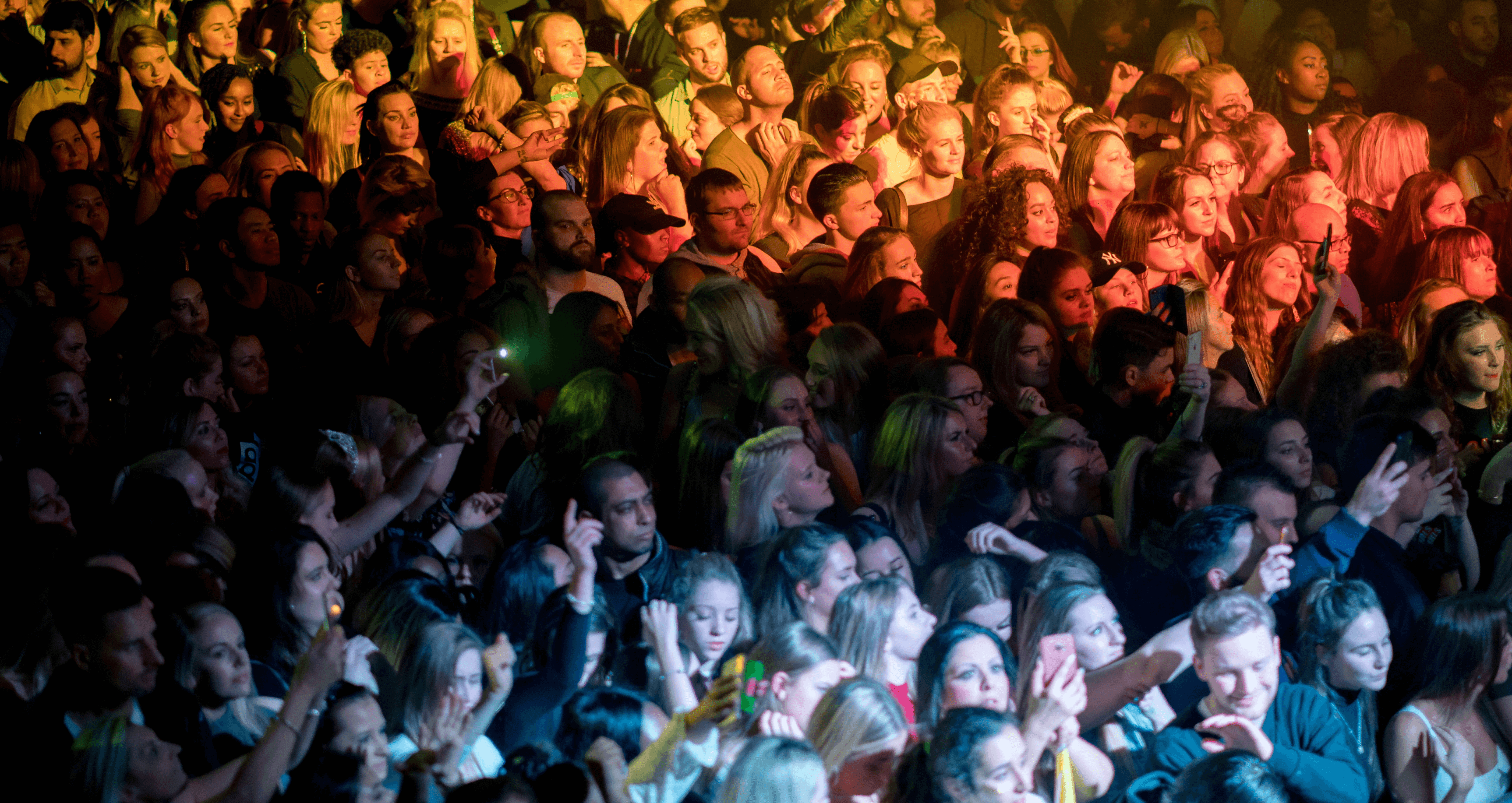
Political Notion
Information Architecture

Political Notion
Information Architecture

Neurodiversity Resources
Concept Development

Neurodiversity Resources
Concept Development
🛠️ Tools + Resources